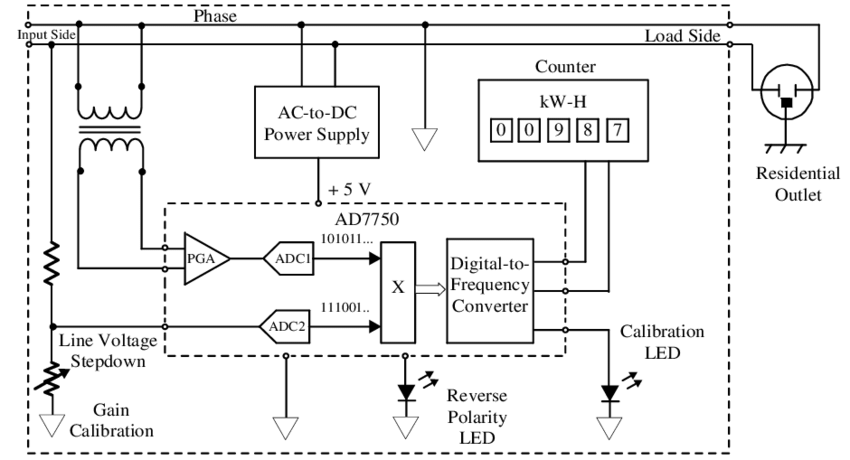In our modern world, where being mindful of energy usage is crucial, it becomes essential to understand the devices that measure and monitor our power consumption. Often, there is confusion among consumers as the terms "energy meter" and "power meter" are used interchangeably.

But are they genuinely identical? In this article, we will explore the intricacies of these meters, unraveling their functions, distinguishing features, and highlighting their significance in today's ever-evolving energy landscape.
Is the Energy Meter and Power Meter the Same?
Energy Meter
An energy meter serves as a tool to measure and document the total electrical energy consumed by a specific circuit or device over a particular time frame. It finds extensive use in residential, commercial, and industrial environments to monitor electricity accurately usage. Energy meters are essential in billing procedures and enable users to track their energy consumption.
Power Meter
On the flip side, a power meter calculates how quickly electrical power is used or supplied, usually in real-time. This device offers valuable insights into the immediate power consumption of an electrical circuit or appliance. Power meters play a crucial role in ensuring the effective functioning of electrical systems and can aid in identifying potential issues with power quality.
Differences between Energy Meters and Power Meters
Measurement Focus
In terms of measuring energy consumption, energy meters play a crucial role. The devices calculate the total energy used within a specific timeframe, typically kilowatt-hours (kWh). By providing valuable information regarding energy usage, they become indispensable tools for billing purposes.
The power meter serves a different purpose compared to energy meters. While energy meters measure overall consumption, power meters specifically gauge the rate at which energy is used, typically in watts (W) or kilowatts (kW). By providing real-time data, power meters give users valuable insights into their electrical systems' immediate power requirements. This enables better understanding and management of power usage.
Billing vs. Monitoring
The energy meter serves as a crucial tool for billing purposes, allowing utility companies to calculate the charges incurred by customers for the electricity they consume throughout a billing cycle. Energy meters also offer convenience to individuals who wish to monitor and manage their energy costs effectively.
Power meters have a vital role in monitoring real-time electrical systems and appliances. They serve as valuable tools, aiding in identifying inefficiencies, unexpected power spikes, or equipment malfunctions. By providing comprehensive insights, these meters help maintain optimal performance and
Application
Energy meters, commonly found in homes, businesses, and industries, play a crucial role in measuring total energy consumption. They provide accurate information for determining electricity costs.
Similarities between Energy Meters and Power Meters
Electrical Measurement
Energy meters and power meters serve as electrical measurement devices. These instruments are utilized to collect data regarding energy consumption and power usage by being connected to electrical circuits or appliances.
Accuracy
Both devices have been specifically designed to ensure accurate measurements. Maintaining precision is paramount when billing or equipment efficiency is at stake.
Digital Displays
Modern energy and power meters often include digital displays that present readings in an easily understandable format. This user-friendly feature enhances the usability of these devices.
Importance in Energy Management
In managing energy, both energy meters and power meters play crucial roles. Energy meters aid in determining overall energy costs, while power meters ensure the efficient operation of electrical systems.
FAQs
What is the critical difference between an energy meter and a power meter?
The primary difference between an energy meter and a power meter lies in their measurement focus. An energy meter measures the total energy consumption over time, providing an overview of usage patterns and trends.
Can I use a power meter to determine my electricity bill?
Power meters do not provide the total energy consumption required for billing. There are separate energy meters specifically designed to fulfill this task.
Are energy meters and power meters essential for home use?
Energy meters are crucial for monitoring residential energy consumption and managing costs effectively. In contrast, power meters find more widespread usage in industrial and commercial settings.
Conclusion
In conclusion, it is essential to note that the terms "energy meter" and "power meter" are often used interchangeably. However, they serve distinct purposes in the world of electrical measurement.
Energy meters specifically focus on calculating total energy consumption for billing purposes. On the other hand, power meters provide real-time insights into power usage. Both devices play crucial roles in efficient energy management and cost control.
When individuals gain an understanding of the similarities and differences between energy meters and power meters, it equips them with the knowledge necessary to make informed choices about their energy consumption and spending.
This awareness is essential for homeowners seeking to reduce electricity costs and industrial facility managers striving for optimal efficiency. By recognizing the distinctions between these devices, you can effectively work towards achieving your energy-related objectives.
So, when someone asks, "Are energy meters and power meter the same?" you can confidently explain the differences between these essential electrical measurement devices.
You Might Also Like: Expressing the Power of Wireless Modbus Technology
Get Knowledge with Aim Dynamic Insights








